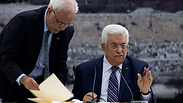
Swiss, UN accept Palestinian requests to join international treaties
PA joins Geneva Conventions, as well as 13 other UN agencies; Palestinian UN ambassador says ready with more applications.
Twenty-five years after making their first bid for membership, the Palestinians can join the Geneva Conventions governing the rules of war and military occupations, the Swiss government said Friday.
Both the United Nations and the Swiss government have accepted the Palestinian Authority's requests to join 14 international treaties and conventions.
Israel had opposed the move, arguing that there is no universally recognized Palestinian state and that it would complicate peace talks.
The Palestinian Authority signed letters of accession to several international treaties after Israel failed to carry out a planned prisoner release that had a March deadline.
Switzerland's Foreign Ministry, as the depositary of the Geneva Conventions, said Friday that "the state of Palestine" acceded to the conventions effective April 2.
Related stories:
- Abbas signs appeals to UN bodies, in sign of collapsing peace talks
- Palestinians ready to widen global recognition bid
Palestinian Authority President Mahmoud Abbas called said Friday that the accession was a "historic day for the Palestinian people."
The Geneva Conventions and their additional Protocols are the fundamental texts of humanitarian law.
Palestinians are attached in particular the Fourth Geneva Convention on the protection of civilians, which defines the duties of "occupying" power. This Convention, which was introduced on August 12, 1949, is often cited by the Palestinian Authority because of its applicability to the Palestinian territories as "occupied territories," as well as Jewish colonization.
Among the obligations of an occupying power, specified in Article 49 of the Convention, is the prohibition of forced transfers and deportations of populations or individuals, as well as the destruction of movable or immovable property, unless it is made "absolutely necessary by military operations."
One aspect of the Geneva Conventions that has raised particular concern in Israel is the prohibition on colonizing occupied land. Israel says this should not apply to the West Bank and Gaza because the two territories exist in sovereignty limbo - no longer claimed by Jordan and Egypt, who ruled them before 1967, while the Palestinians have never had a state.
Israel has also argued that east Jerusalem should not be considered occupied because it has extended citizenship rights to its Arab residents, although only several thousand of the city's quarter million Arab residents have taken advantage of this. The international community has not recognized Israel's annexation.
The Palestine Liberation Organization first asked to join the Geneva Conventions on June 21, 1989. At the time, the Swiss Foreign Ministry said it was not in a position to decide on the bid "due to the uncertainty within the international community as to the existence or non-existence of a State of Palestine."
On Thursday, the United Nations said Secretary-General Ban Ki-moon accepted Palestinian applications to join 13 other conventions, saying they were "in due and proper form."
Among these international treaties are the Vienna Conventions on Diplomatic and Consular Relations, the Convention on the Rights of the Child, the Convention against Torture and one against corruption.
UN spokesman Stephane Dujarric told reporters Thursday that Ban informed all 193 UN member states of his acceptance.
Riyad Mansour, the Palestinian UN ambassador, said Tuesday that Palestine will officially become a state party to 13 of the 15 conventions on May 2 - and is ready with more applications to join UN agencies, conventions and treaties depending on Israel's actions.










